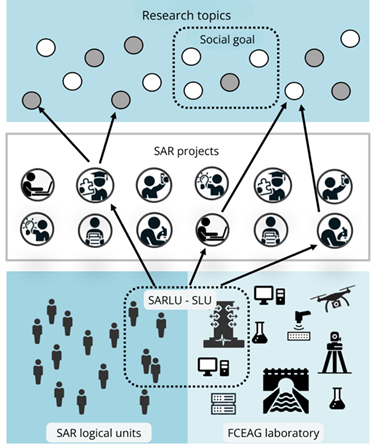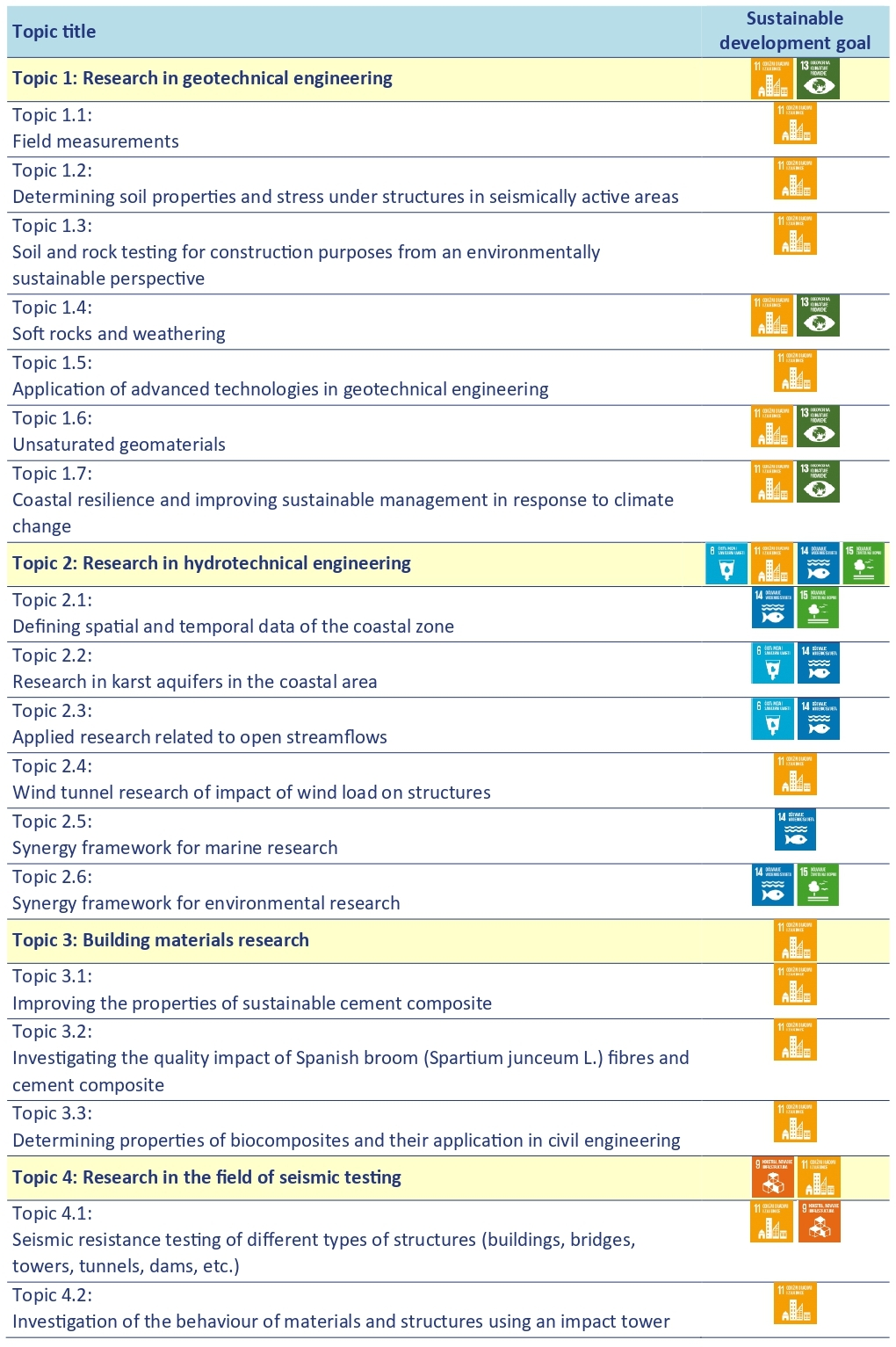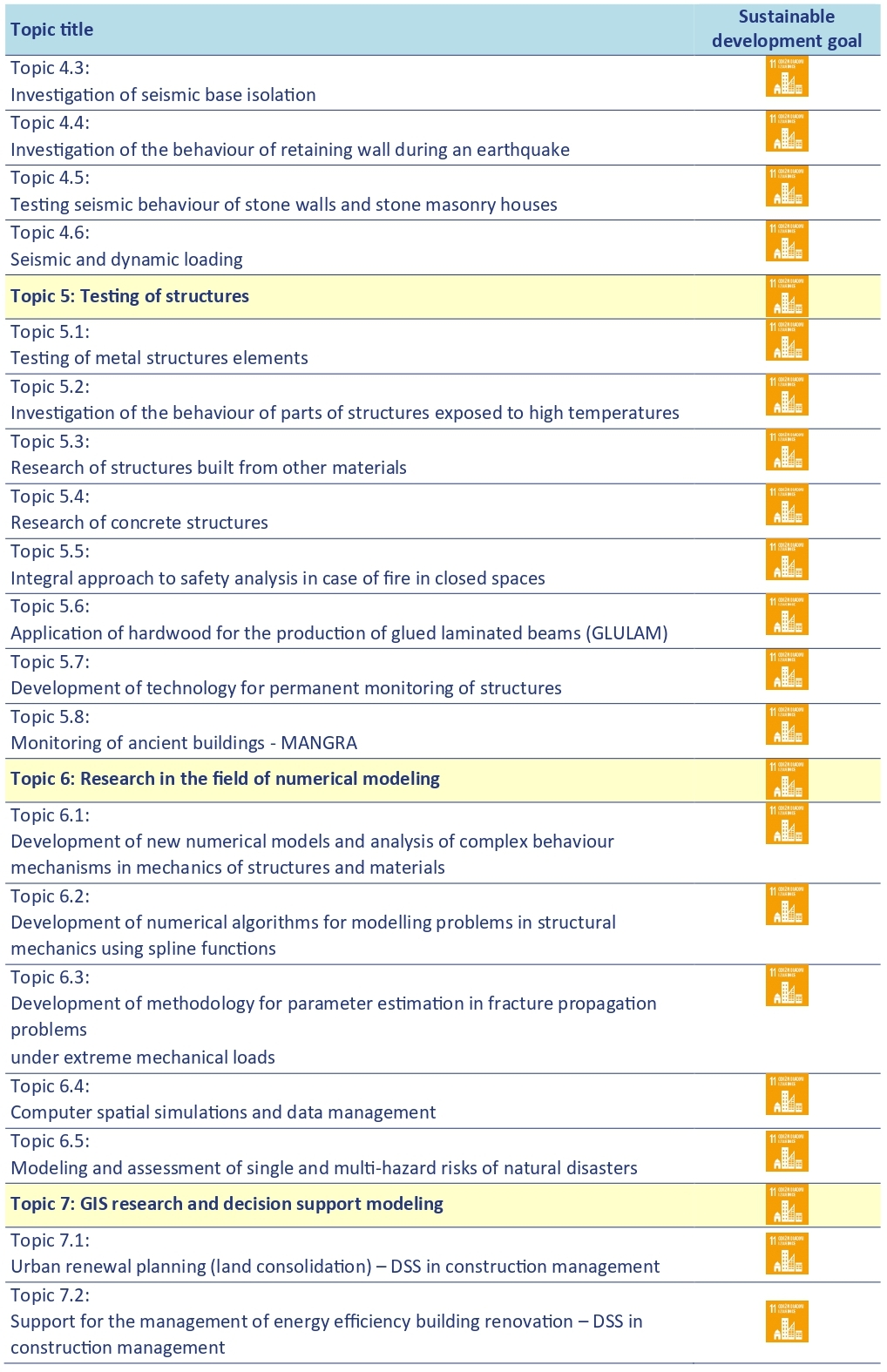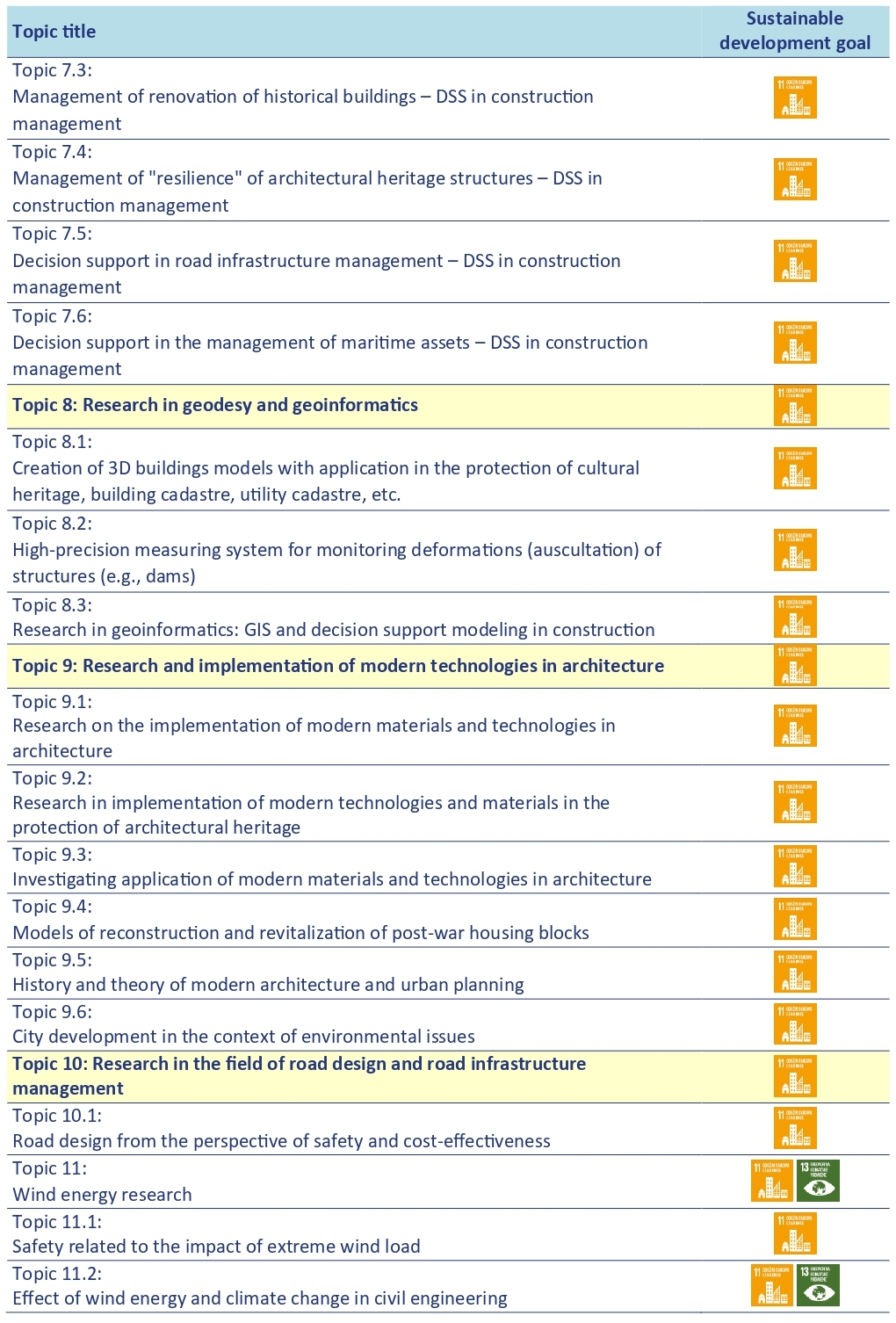Forms
Structure and Organisation of the Study Programme
The study programme is organised as full-time study and lasts from three to four years (eight semesters) or as a part-time programme which lasts six years (12 semesters), during which the student collects the minimum of 240 ECTS credits. Exceptionally, according to the Ordinance, the maximum duration for the full-time study programme is six years and eight years for the part-time programme. Compulsory and elective classes are carried out during the first two semesters. Last three years are exclusively scheduled for research-related activities, i.e. writing of the dissertation. From the total of 240 ECTS credits, 60 ECTS credits are acquired by examining the 7th level learning outcomes of compulsory and elective courses in line with the Ordinance, and180 ECTS credits in the activities related to the original scientific research resulting in writing and defending of the doctoral thesis.
The student achieves the minimum of 42 ECTS upon the examination of the learning outcomes of this study programme, and the remaining credits (maximum of 18 ECTS credits) can be achieved through acquisition and examination of 7th level learning outcomes at the constituent entities of the University of Split, other universities in the Republic of Croatia and/or abroad. According to the Ordinance, upon supervisor`s request, a certain number of ECTS credits can be awarded to the student for previously acquired 7th level learning outcomes. Ideally, the candidate can be released from attending classes at the preparatory year.
The Faculty of Civil Engineering, Architecture and Geodesy provides professional scientific advancement to doctoral candidates in the area of technical sciences, filed of Civil Engineering and other fundamental technical sciences.
Upon the completed admission procedure, a supervisor is assigned to each student. Co-supervisor can be appointed in addition to the supervisor. Supervision is granted pursuant to Article 33 of the Ordinance. In order to obtain the doctoral the degree, the candidate, under the supervisor`s supervision, performs research-related activities, which are provided by the study programme through Research I, II and III. The student thus acquires knowledge and skills for independent research and successful preparation of his/her dissertation.
List of Compulsory and Elective Courses
Except for Research I, II and III and the course Methodology and Techniques of Scientific Research, all other courses are elective. Depending on the candidate`s interest and research topic, the supervisor advises the candidates on the selection of courses, whereas the selected courses should be applicable to the research topic. Each course is represented through the immediate classes and the writing of the seminar paper, which contains experimental work and theoretic analysis of the concerned issue. The seminar paper is composed in line with the rules set out for the writing of scientific and professional papers. The majority of exams is carried out through oral presentation of the seminar paper, unless otherwise provided by the syllabus.
Research-relate activities carried out for the purpose of obtaining the doctoral degree are provided in the study programme through the courses Research I, II and III, which prepare the student for successful participation and autonomy in research-related activities and the composition of the dissertation. Learning outcomes are examined through seminar papers presenting research methods and papers accepted for publishing in journals or papers accepted for presentation at international conferences.
The list of compulsory (research) activities and elective courses across semesters with the number of ECTS credits is presented in the following tables:
| |
Course Name / Activities |
Code |
ECTS |
| I Semester |
| |
Research I |
GAXA01 |
30 |
| |
Elective courses |
|
|
| II Semester |
| |
Research I |
GAXA01 |
30 |
| |
Elective courses |
|
|
| III Semester |
| |
Research II |
GAXB01 |
30 |
| IV Semester |
| |
Research II |
GAXB01 |
30 |
| V Semester |
| |
Research III |
GAXC01 |
30 |
| VI Semester |
| |
Research III |
GAXC01 |
30 |
| |
The following table presents the list of the elective courses (for each course, the weekly workload is 30+0 hours).
| |
Course |
Code |
ECTS |
| Elective Courses in the field of Civil Engineering, Branch of Bearing Structures |
| B. Gotovac, V. Kozulić |
Meshless Numerical Methods and Corresponding Adaptive Techniques |
GAKA01 |
6 |
| V. Kozulić, B. Gotovac |
Numerical Modelling of Shell Structures |
GAKA02 |
6 |
| P. Marović, M. Galić |
Numerical Methods for the Mechanics of Materials |
GAKA03 |
6 |
| P. Marović, M. Galić |
Experimental Methods |
GAKA04 |
6 |
| A. Mihanović, H. Smoljanović |
Selected chapters of Structural Dynamics and Earthquake Engineering |
GAKA05 |
6 |
| A. Mihanović, B. Trogrlić |
Selected chapters of Structural Stability |
GAKA06 |
6 |
| Ž. Nikolić |
Finite Element Method |
GAKA07 |
6 |
| I. Boko, N. Torić, B. Peroš |
Extreme Actions and Structure Safety/Stability |
GAKA08 |
6 |
| I. Boko, N. Torić, B. Peroš |
Steel and Composite Structures |
GAKA09 |
6 |
| A. Harapin, D. Matešan |
Numerical Modelling of Concrete Structures |
GAKA10 |
6 |
| A. Harapin, D. Matešan |
Design of Supporting Systems of Bridges and Structures |
GAKA11 |
6 |
| A. Munjiza |
Mechanics of Discontinua |
GAKA12 |
6 |
| A. Harapin, D. Matešan |
Numerical Modelling of Water-Soil-Structure Dynamic Interaction |
GAKA13 |
6 |
| A. Harapin, D. Matešan |
Advanced Concrete and Masonry Structures |
GAKA14 |
6 |
| Elective Courses in the field of Civil Engineering, Branch of Hydrotechnics |
| R. Andričević, H. Gotovac |
Dispersion Processes in Water Resources |
GAHA01 |
6 |
| R. Andričević, V. Srzić |
Theory of Risk Assessment in Environmental Engineering |
GAHA02 |
6 |
| O. Bonacci |
Karst Water Resources |
GAHA03 |
6 |
| O. Bonacci |
Ecohydrology |
GAHA04 |
6 |
| V. Denić - Jukić |
Hydrological Modelling in Karst |
GAHA05 |
6 |
| N. Leder |
Marine Hydraulics, special chapters |
GAHA06 |
6 |
| J. Margeta, I. Andrić |
System Engineering in Water Resources Management |
GAHA07 |
6 |
| J. Margeta, I. Andrić |
Coastal Processes |
GAHA08 |
6 |
| O. Bonacci |
Selected chapters on Karst Hydrogeology |
GAHA09 |
6 |
| H. Gotovac |
Introduction to Engineering Numerical Modelling |
GAHA10 |
6 |
| D. Jukić |
Analysis of Hydrological Time Series |
GAHA11 |
6 |
| Elective Courses in the field of Civil Engineering, Branch of Transportation |
| D. Cvitanić |
Traffic Flow Theory |
GAPA01 |
6 |
| D. Breški |
Highways – selected chapters |
GAPA02 |
6 |
| D. Cvitanić, D. Breški |
Transport Planning |
GAPA03 |
6 |
| Elective Courses in the field of Civil Engineering, Branch of Geotechnics |
| P. Miščević |
Selected chapters from Rock Mechanics |
GAGA01 |
6 |
| T. Roje - Bonacci |
Soil Mechanics Models |
GAGA02 |
6 |
| T. Roje - Bonacci |
Special chapters in Foundation Engineering |
GAGA03 |
6 |
| Elective Courses in the field of Civil Engineering, Branch of Materials |
| S. Juradin |
Rheology of Materials |
GAMT01 |
6 |
| S. Juradin |
New Materials in Civil Engineering |
GAMT02 |
6 |
| Elective Courses in the Field of Fundamental Technical Sciences, Branch of Organisation of Work and Production |
| N. Jajac |
System Engineering in Project Management |
GALA01 |
6 |
| N. Jajac |
Decision Support Systems |
GALA02 |
6 |
| K. Rogulj |
System Theory |
GALA03 |
6 |
| Elective Course in the Field of Architecture and Urban Planning |
| D. Tušek |
Highways and the Environment |
GAAA01 |
6 |
| Elective Courses in the field of Technical Sciences |
| P. Marović, M. Galić |
Methodology and Techniques of Scientific Research |
GATA01 |
6 |
| A. Munjiza |
Information Engineering |
GATA02 |
6 |
| A. Munjiza |
Engineering Simulations Techniques |
GATA03 |
6 |
| Elective Courses in the field of Natural Sciences, Branch of Mathematics |
| S. Ivelić Bradanović |
Applied Functional Analysis |
GAMA01 |
6 |
| J. Sedlar |
Practical Methods of Optimisation |
GAMA02 |
6 |
| B. Vrdoljak, S. I. Bradanović |
Mathematical Analysis of Boundary Value Problems |
GAMA03 |
6 |
| B. Vrdoljak, S. Banić |
Integral Equations |
GAMA04 |
6 |
| B. Vrdoljak, J. Sedlar |
Methods of Mathematical Statistics |
GAMA05 |
6 |
Learning Outcomes and Competences
Doctoral degree in Civil Engineering at this faculty implies a very high level of scientific education based on the most recent findings from the relevant research field with the minimum of three years of research-related activities. The candidates with this degree can work in public and private sector, with the following competences:
- Devise scientific research, in cooperation with the supervisor, in order to establish new hypotheses and reach new scientific achievements within the selected research area;
- Prepare and present a public communication about the research results at an international conference;
- Successfully defend the hypothesis and the results of scientific research, and present substantiated arguments in the discussion at the international conference;
- Provide critical analysis and reasoning of published scientific papers of other authors within the selected scientific area;
- Write and successfully publish at least one scientific paper as the main author in an international peer-reviewed journal;
- Write a complete doctoral dissertation, publicly present it and successfully defend it;
- Implement new knowledge and scientific cognitions from the doctoral thesis in practice;
- Participate in the work of scientific teams for the purpose of realising national and international scientific projects.
Research Topics
The research topics of FCEAG belong to the field of engineering sciences in areas related to civil engineering, architecture and urban planning, as well as geodesy and geoinformatics. Since contemporary social challenges also require the integration of social studies, scientific research extends to the interdisciplinary area. Sustainable development presents a major contemporary social challenge, determining several new goals especially relevant to the coastal areas of the Mediterranean. Therefore, research topics investigated by the Faculty cover sustainable construction, management of the existing built environment with a special focus on infrastructure systems and built heritage, natural resources management, and environmental protection, with an emphasis on water and sea management and protection.
The organisational restructuring produced an organisational structure based on a modern project-orientated approach combined with the core and traditional functions of the scientific and research activities of FCEAG. The organisational structure of scientific research activities is determined by the following:
- organisational units – 11 science and arts logical units (SARLU), the Office for Research and Development, joint management of research and development capacities (R&DO) and the FCEAG Laboratory
- some science and arts projects (SAR projects) with corresponding project activities
The new organisational model for FCEAG scientific activities is presented in the picture below. SAR logical units with corresponding laboratory equipment represent the Faculty research resources engaged in SAR projects. SAR projects combine activities in one or more research topics, with research results focused on providing solutions to given social challenges.

The scientific research topics and the corresponding sustainable development goals related to the research focus are presented in the picture below:


